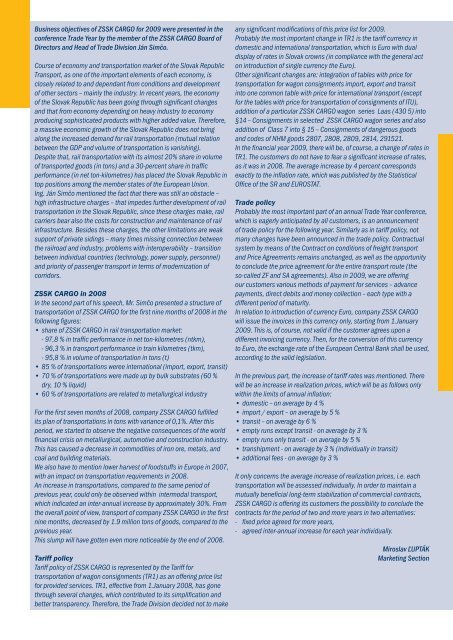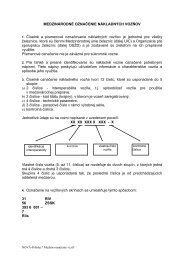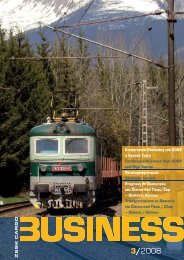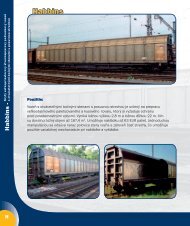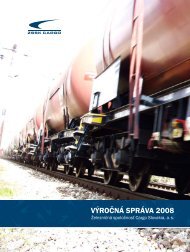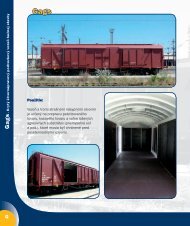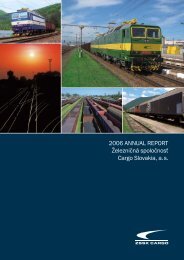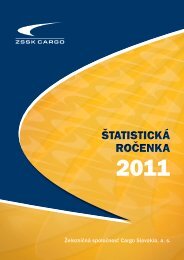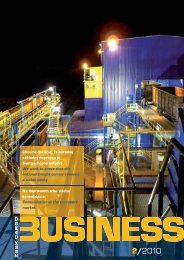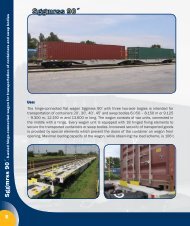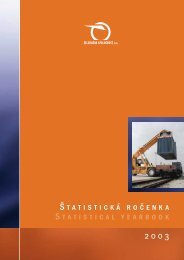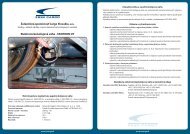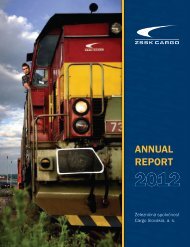CARGO BUSINESS 1-09.indd - ZSSK Cargo
CARGO BUSINESS 1-09.indd - ZSSK Cargo
CARGO BUSINESS 1-09.indd - ZSSK Cargo
- No tags were found...
You also want an ePaper? Increase the reach of your titles
YUMPU automatically turns print PDFs into web optimized ePapers that Google loves.
Business objectives of <strong>ZSSK</strong> <strong>CARGO</strong> for 2009 were presented in theconference Trade Year by the member of the <strong>ZSSK</strong> <strong>CARGO</strong> Board ofDirectors and Head of Trade Division Ján Simčo.Course of economy and transportation market of the Slovak RepublicTransport, as one of the important elements of each economy, isclosely related to and dependant from conditions and developmentof other sectors – mainly the industry. In recent years, the economyof the Slovak Republic has been going through significant changesand that from economy depending on heavy industry to economyproducing sophisticated products with higher added value. Therefore,a massive economic growth of the Slovak Republic does not bringalong the increased demand for rail transportation (mutual relationbetween the GDP and volume of transportation is vanishing).Despite that, rail transportation with its almost 20% share in volumeof transported goods (in tons) and a 30-percent share in trafficperformance (in net ton-kilometres) has placed the Slovak Republic intop positions among the member states of the European Union.Ing. Ján Simčo mentioned the fact that there was still an obstacle –high infrastructure charges – that impedes further development of railtransportation in the Slovak Republic, since these charges make, railcarriers bear also the costs for construction and maintenance of railinfrastructure. Besides these charges, the other limitations are weaksupport of private sidings – many times missing connection betweenthe railroad and industry, problems with interoperability – transitionbetween individual countries (technology, power supply, personnel)and priority of passenger transport in terms of modernization ofcorridors.<strong>ZSSK</strong> <strong>CARGO</strong> in 2008In the second part of his speech, Mr. Simčo presented a structure oftransportation of <strong>ZSSK</strong> <strong>CARGO</strong> for the first nine months of 2008 in thefollowing figures:• share of <strong>ZSSK</strong> <strong>CARGO</strong> in rail transportation market:- 97,8 % in traffic performance in net ton-kilometres (ntkm),- 96,3 % in transport performance in train kilometres (tkm),- 95,8 % in volume of transportation in tons (t)• 85 % of transportations weree international (import, export, transit)• 70 % of transportations were made up by bulk substrates (60 %dry, 10 % liquid)• 60 % of transportations are related to metallurgical industryFor the first seven months of 2008, company <strong>ZSSK</strong> <strong>CARGO</strong> fulfilledits plan of transportations in tons with variance of 0,1%. After thisperiod, we started to observe the negative consequences of the worldfinancial crisis on metallurgical, automotive and construction industry.This has caused a decrease in commodities of iron ore, metals, andcoal and building materials.We also have to mention lower harvest of foodstuffs in Europe in 2007,with an impact on transportation requirements in 2008.An increase in transportations, compared to the same period ofprevious year, could only be observed within intermodal transport,which indicated an inter-annual increase by approximately 30%. Fromthe overall point of view, transport of company <strong>ZSSK</strong> <strong>CARGO</strong> in the firstnine months, decreased by 1.9 million tons of goods, compared to theprevious year.This slump will have gotten even more noticeable by the end of 2008.Tariff policyTariff policy of <strong>ZSSK</strong> <strong>CARGO</strong> is represented by the Tariff fortransportation of wagon consignments (TR1) as an offering price listfor provided services. TR1, effective from 1.January 2008, has gonethrough several changes, which contributed to its simplification andbetter transparency. Therefore, the Trade Division decided not to makeany significant modifications of this price list for 2009.Probably the most important change in TR1 is the tariff currency indomestic and international transportation, which is Euro with dualdisplay of rates in Slovak crowns (in compliance with the general acton introduction of single currency the Euro).Other significant changes are: integration of tables with price fortransportation for wagon consignments import, export and transitinto one common table with price for international transport (exceptfor the tables with price for transportation of consignments of ITU),addition of a particular <strong>ZSSK</strong> <strong>CARGO</strong> wagon series Laas (430 5) into§14 – Consignments in selected <strong>ZSSK</strong> <strong>CARGO</strong> wagon series and alsoaddition of Class 7 into § 15 – Consignments of dangerous goodsand codes of NHM goods 2807, 2808, 2809, 2814, 291521.In the financial year 2009, there will be, of course, a change of rates inTR1. The customers do not have to fear a significant increase of rates,as it was in 2008. The average increase by 4 percent correspondsexactly to the inflation rate, which was published by the StatisticalOffice of the SR and EUROSTAT.Trade policyProbably the most important part of an annual Trade Year conference,which is eagerly anticipated by all customers, is an announcementof trade policy for the following year. Similarly as in tariff policy, notmany changes have been announced in the trade policy. Contractualsystem by means of the Contract on conditions of freight transportand Price Agreements remains unchanged, as well as the opportunityto conclude the price agreement for the entire transport route (theso-called ZF and SA agreements). Also in 2009, we are offeringour customers various methods of payment for services – advancepayments, direct debits and money collection – each type with adifferent period of maturity.In relation to introduction of currency Euro, company <strong>ZSSK</strong> <strong>CARGO</strong>will issue the invoices in this currency only, starting from 1.January2009. This is, of course, not valid if the customer agrees upon adifferent invoicing currency. Then, for the conversion of this currencyto Euro, the exchange rate of the European Central Bank shall be used,according to the valid legislation.In the previous part, the increase of tariff rates was mentioned. Therewill be an increase in realization prices, which will be as follows onlywithin the limits of annual inflation:• domestic – on average by 4 %• import / export – on average by 5 %• transit – on average by 6 %• empty runs except transit - on average by 3 %• empty runs only transit - on average by 5 %• transhipment - on average by 3 % (individually in transit)• additional fees - on average by 3 %It only concerns the average increase of realization prices, i.e. eachtransportation will be assessed individually. In order to maintain amutually beneficial long-term stabilization of commercial contracts,<strong>ZSSK</strong> <strong>CARGO</strong> is offering its customers the possibility to conclude thecontracts for the period of two and more years in two alternatives:- fixed price agreed for more years,- agreed inter-annual increase for each year individually.Miroslav ĽUPTÁKMarketing Section


